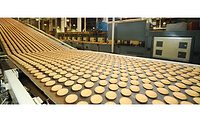Exclusive interview: Q&A with Belt Technologies, on steel belts and robotics during COVID times




Snack Food and Wholesale Bakery recently was able to speak to Denis Gagnon, chief executive officer, Belt Technologies, Agawam, MA about steel belts and robotics during the COVID-19 pandemic.
Liz Parker: How have robotics and stainless steel belt businesses helped to keep distribution running during the COVID-19 pandemic?
Denis Gagnon: With widespread coronavirus concerns, especially in food processing and distribution plants, there is a stronger demand than ever for safer, more hygienic practices throughout the food industry. Belt Technologies, Inc., manufacturer of custom metal belt conveyor and drive tape solutions for more than five decades, supplies metal belts to robotic equipment manufactures that drive fully automated food distribution facilities. Already in demand due to their efficiency, these facilities are inherently safer to operate during such a pandemic keeping distribution systems, and the supply chain, stable. Additionally, endless stainless steel belts and conveyor systems, which are sanitary and easy to clean, are ideal for use in food processing facilities, as well.
LP: How are robots a better / more efficient choice than humans during times like these?
DG: Since robots require neither social distancing nor sick time, they can continue to operate during times of crisis, such as the coronavirus pandemic, when human workers are at risk. Robots running on steel belt technologies can lift heavy grocery and warehouse totes. They can deploy multiple synchronized belts with tight tolerances, increasing the robot’s lifespan and allowing for repeatability across mass batches of production.
LP: How can steel belts help prevent jams in robotic automation?
DG: The high tensile strength of steel belts makes them exceptionally resilient, and helps prevent jams in robotic automation. Steel belts also do not stretch or elongate, and can withstand extreme environments such as high or low temperatures and vacuums. They reliably perform tasks that demand rapid acceleration, precise positioning and repetition.
LP: What’s next for robotic technologies in the food industry?
DG: Concern over contagious diseases continues to rise, with greater importance placed on prevention strategies in every sector of private and public life. Robotics incorporating conveyor belts are an essential part of food processing. Keeping them clean is a top priority of food processors, as contamination can move at great speed before being detected. That’s why stainless steel has become and will continue to be the finish of choice for such equipment in the food industry.
Looking for a reprint of this article?
From high-res PDFs to custom plaques, order your copy today!











